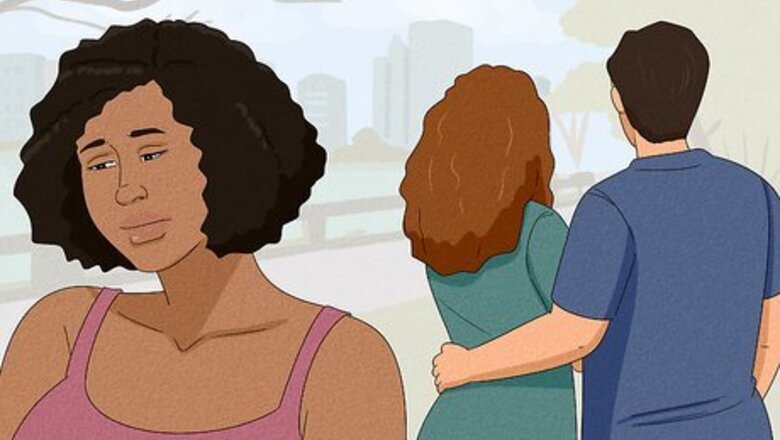
views
- Reflect on your dating experiences and personal traits. You may be single because of things like low self-esteem, unresolved trauma, or settling.
- Put yourself out there and stay optimistic—when you position yourself to find and accept love, it’s only a matter of time before it happens.
- Remember that it’s completely normal to want to find and feel love, and many others are struggling to build loving, long-term relationships too.
Reasons You Might Be Struggling

You’re pursuing unavailable people. Unavailable can mean lots of things—maybe the last person you dated was married or lived far away, or maybe you gravitate towards people who can’t open up emotionally. Whatever the case, save your dating energy for someone who wants to and can be with you. Pursuing relationships with unavailable people usually ends in heartbreak. Notice early on if your partner doesn’t seem willing to open up or spend time with you. If that’s the case, they’re unlikely to become available later. If you feel strung along, ask to define your relationship. If the other person recoils from a label, it’s a clue they won’t make things official.

You’re afraid of getting hurt or rejected. If you’re afraid things won’t work out, chances are you won’t pursue them. Maybe you’re afraid to make a move at all, or you find a reason to back out of relationships because you’re afraid your partner will leave you one day. These are both forms of self-sabotage that prevent you from connecting with your potential true love. Remember, getting rejected is something everyone experiences. Many times, it's a valuable lesson that makes you a stronger, wiser person.

You’re insecure or have low self-esteem. If you struggle with low self-worth, you may constantly doubt the love and praise of your partner or convince yourself that they can’t love you. Other times, low self-esteem might make you codependent on your partner for happiness and reassurance. This makes it hard for the other person to want to stay in the relationship, which fuels your self-doubt even more. Work on building positive self-esteem and confidence to keep insecurity from affecting your future relationships and day-to-day life.
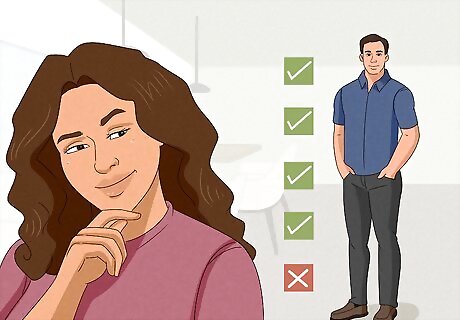
You’re only looking for the “perfect person.” If your standards are too high, you may never find someone “good enough” to love. This isn’t to say you should lower your standards—just remember that nobody is perfect. Instead of focusing on someone’s flaws, look at how they try to win you over or show you love. When you see that they truly care for you, it will become easier to look past their shortcomings. Remember that true love is about loving someone for who they are, even if they’re not the world’s most perfect person. Work on self-improvement to attract higher quality partners. When you “walk the walk” yourself, you’re more likely to meet people who are on your level.

Your standards are too low or you’re settling. If you struggle with confidence or have insecurity about being alone, you might end up dating people who don’t meet your standards for a partner. Your chances for long-term relationship success with these people are low because they can’t give you what you really want or need. Be honest with yourself about your must-haves in a relationship, and commit to dating people who check the right boxes.

You’re not putting yourself out there. Finding love takes work, and those who wait around for it are less likely to find it. If you’re serious about love, put yourself in situations where it can find you—make new friends, explore new hobbies, or sign up for an interesting night class. These are all opportunities to meet someone new who shares your interests. Go where new people are—if you’re always with the same friends at the same bars, you’re less likely to meet a potential romantic partner. If you’re not sure where to start try signing up for recreational sports teams, book clubs, charity events or volunteer work, or visit local community events. Ask a friend to be a matchmaker if you need some help putting yourself out there.

You’re not over an ex or an old relationship. You may have started dating too soon after a breakup and didn’t allow yourself to grieve the loss. Now you’re covering up those feelings of hurt with somebody new. Trust that if you’re not with your ex, you simply weren’t a good match. It’s OK to still hold love or grief over an ex, so let yourself work through your emotions without judgment. Recovering from a breakup is different for everyone. If it’s fresh, distract yourself with things and people you enjoy. Take time to learn why it wasn’t a good match and gain some wisdom from the experience. Wait at least 3-6 months after a breakup before you date again. Remind yourself of your ex’s negative qualities to stop visualizing the future you could’ve had together.
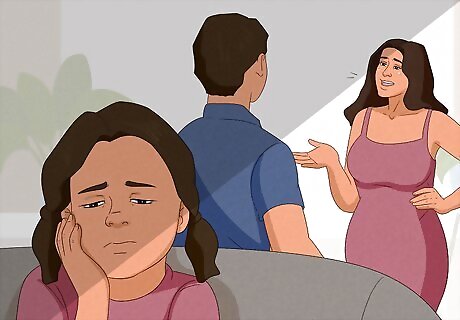
There’s a childhood trauma blocking your ability to connect and love. Unresolved trauma, big or small, can make it difficult to accept love from a partner. Some common traumas that affect people’s ability to love include being abandoned by a parent, witnessing domestic violence or being the subject of abuse, parental neglect, or parents with a personality disorder. These often lead to future abandonment or attachment issues in the child. Identify your traumas and start working through them (possibly with a therapist or counselor) to learn to accept love without fear of what the outcome may be.
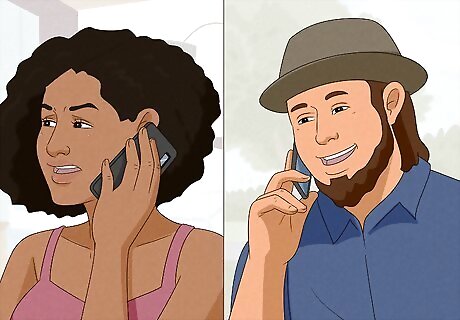
Your relationship pacing is a little off. It’s great to be enthusiastic about a new relationship, but maybe you tend to jump the gun and say “I love you” too soon or expect the new person to see you every day. This kind of behavior can intimidate or turn away someone whose feelings for you are still developing. Going forward, let things develop naturally—it’s better to err a bit on the slow side versus going too fast. Take your time to really get to know someone. When initiations of interactions are fairly balanced, it’s a good sign that things are moving the right way.

You’ve got priorities more important than dating. Maybe you value your career, hobbies, or friends and family above finding a relationship right now. Finding and sustaining a loving partnership is time consuming, and it could be that you just haven’t found the one you’d be willing to rearrange your priorities for. Not prioritizing love isn’t a bad thing—it’s just hard to fit it into your schedule when you keep yourself busy with other things. Don’t drop everything for a partner. Keep doing what you love and you’ll find someone who can keep up or who you're willing to compromise for. Ask yourself if your relationships fizzle out because of your career, distance, family, or something else to determine what’s pushing romance down your list.

You don’t really want a relationship right now. Deep down, you might be perfectly happy with being single. Often, people feel pressured into finding a partner by friends, family, society, or your biological clock. Be honest with yourself and evaluate the pros and cons of getting in an amazing relationship. Your lists will give you clarity about why you’re single and whether or not you want to stay that way. Wanting to be single for now doesn’t mean you’ll never find love in the future. If you’re happy now, there’s nothing wrong with being single!

You just haven’t met the right person yet. It might sound obvious or cliché, but there’s a real chance that you simply haven’t crossed paths with your perfect match. There’s absolutely nothing wrong with that—all it means is that you can look forward to meeting someone you love (and if you’re putting in the work, that day will come sooner than later).
Changing Your Strategy

Trust your instincts and keep an eye out for red flags. If your gut is telling you that you won’t find lasting love with someone, evaluate how they make you feel and look for problematic behaviors that could affect a long-term relationship. Remember not to expect someone to change—often, what you see is what you get. Some common red flags to watch out for include: The person makes you feel insecure, ashamed, or undervalued. The relationship is alcohol or drug dependent. Commitment or trust issues. There’s little to no nonverbal communication. Jealousy over outside interests, friends, or family. Controlling behavior. An exclusively sexual relationship. No one-on-one or quality time.

Let yourself be more vulnerable and open. To build a trusting and loving relationship, be willing to connect with your partner or date in a safe, open way that allows you to get to know each other. Many people tend to be closed off or share too much, so look for a happy middle ground. It’s possible to shield your feelings without coming off defensive or guarded. If your partner is closed off, think about if they’re in a place to be vulnerable with you as well. If they're not open to love, don’t date them right now. It’s OK to admit your fear of vulnerability—even that counts as opening up to someone! Start gradually and share your feelings as you feel them to avoid bottling things up.

Build up your self-esteem and confidence. Real confidence can’t be faked, so put in some work to make yourself feel powerful. If you struggle to make the first move, “practice” by striking up conversations with random people. There’s nothing like a warm smile and making flirty eye contact to make yourself seem confident and gauge whether someone is interested in you. Explore self-improvement strategies like seeing a therapist, working out regularly, and taking good care of yourself so you feel and look your best. You don’t need the perfect body to be confident—put on something that flatters your physique and wear a memorable accessory to invite conversations.

Get crystal clear on your romantic needs and wants. Wants are things that are negotiable, like occupation, intellect, or appearances, that you can learn about someone pretty quickly. Needs, like compatible values or goals, are non-negotiable and it takes more time to find out if someone meets these criteria. Once you find out what you want, examine your list to see where you might be limiting yourself unnecessarily. For example, it might be more important to meet someone who’s naturally curious rather than highly intelligent, or who comes from a similar family rather than a certain social class. Focus on the things you do want in someone rather than a list of what you don’t want.

Keep an open mind when you don’t feel a “spark” right away. Instant sexual attraction or hot chemistry doesn’t mean you’ll develop a long-term relationship with someone. Your feelings for someone can change and deepen over time if you give them the chance to grow. Keep this in mind especially if you tend to get in relationships built on initial attraction. Go for a second date with someone, even if the first wasn’t spectacular. You never know how the other person feels, and it could be a different experience. Often, true love builds like a slow burn while instant sexual attraction can fade over time.

Prioritize dating and put yourself in a position to meet new people. If love is what you want, continue putting yourself out there. You may have to go through some more people to find somebody who’s patient and loving and kind, but that person is definitely out there. Go places and do things that bring you joy, like social groups or clubs or working for a cause you believe in—the worst that could happen is you meet someone like-minded. If you’ve resisted online dating until now, create a profile on a site to access a bigger pool of people to date. If you’re already online, try a new site or app.

Focus on having fun. Take the pressure off of yourself to find love as soon as possible. Being single is a great time to expand your social circles, try new things, and work on making yourself happy. Happy people meet other happy people, so try your best to start acting like the person you’d want to meet. Challenge yourself to get out of your comfort zone. You’ll grow into a happier, more confident person and might meet some people along the way! Use your time as single to address underlying issues keeping you from being happy, like healing past traumas or releasing a fear of rejection.
Will I ever find love?

If you really want love, you’ll find a way to bring it into your life. You can’t control who will love you back, but if you’re clear on what you want and are willing to put in the time and effort, you have the power to make it happen. Keep saying “yes” to dates and meeting new people—if you give yourself enough chances, it’s only a matter of time. Stay optimistic and positive about any potential partner. When you make them feel valued and appreciated, they’ll return the feeling back to you. There’s no such thing as false hope. There’s always the opportunity to change something about your love life or meet someone new.

You might have already met the love of your life. Remember that instant attraction and long-term love don’t always go hand-in-hand. It’s very possible that one of your friends, coworkers, or acquaintances is a perfect match for you, but you just haven’t realized it yet. Keep an open mind and give your feelings the chance to deepen—friends can become lovers if the relationship is allowed to bloom.

Remember that other people are searching for love, too. The need to feel loved is universal, and you’re not the only person who might be struggling to find a meaningful romantic connection. Accept that you want to be loved—society may tell you it’s a weakness, but it’s completely normal and everyone possesses the traits, qualities, and values that make them deserving of love. Try uplifting yourself with these affirmations if you feel lonely or undeserving of love: “I am a worthy person of love because I am alive.” “I am strong because I know I need love, and I know that I am a person who can be loved.” “One day I will find a person who loves me for who I am.”












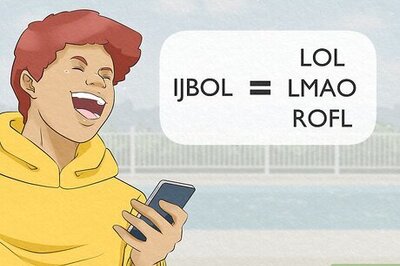


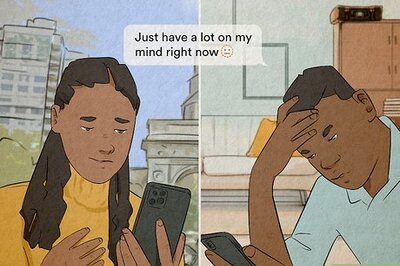




Comments
0 comment